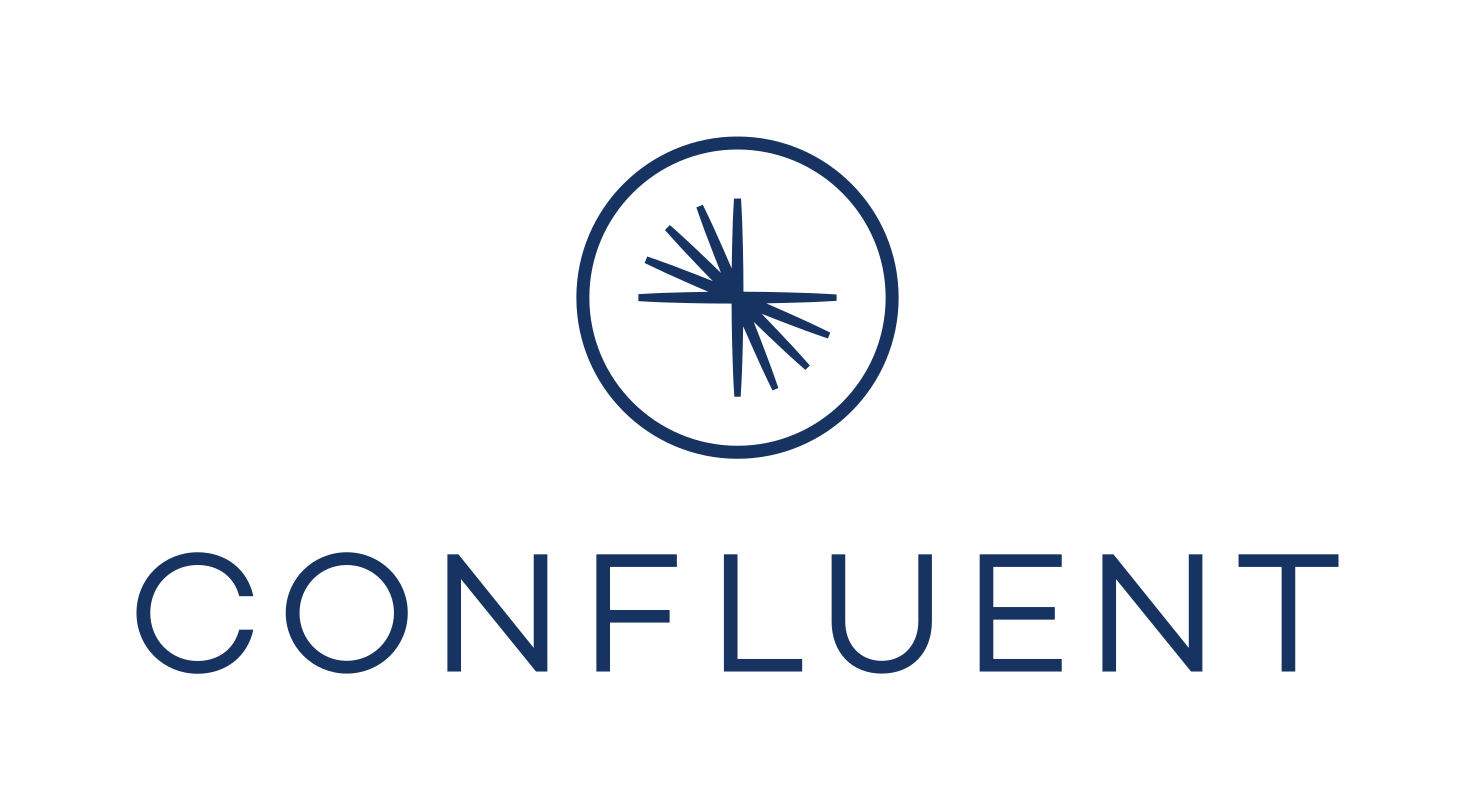
Overview

Video 1

Video 1

Video 2

Video 3
Confluent is a cloud-native, data streaming platform that enables you to stream, connect, process, and govern all of your data, allowing you to streamline AI workloads and accelerate data-driven decisions.
Confluent has re-architected Apache Kafka for AWS, offering a fully managed, elastic, and globally available service that seamlessly connects with AWS services, security, management, and billing, while allowing you to cost-effectively retain data at any scale with Infinite Storage. With Kora, the cloud-native Kafka engine, you can achieve 10x better performance at 60% lower cost, along with unmatched scalability and reliability.
Our serverless Apache Flink service, lets you easily leverage stream processing to filter, join, aggregate, and enrich your streams in real-time before sharing the data broadly to downstream systems and applications.
We make it easy for you to connect and migrate on-premises, multi-cloud, and edge data to AWS. With 120+ pre-built connectors, you can build real-time streaming pipelines with just a few clicks to Amazon S3, Amazon Redshift, Amazon Kinesis, Amazon Relational Database Service (RDS), Amazon DynamoDB, and more. Also, deeper integrations with our Connect with Confluent (CwC) partners, such as AWS Lambda, can be found directly within the AWS console, making it easier for their customers to use data streams.
Commits allow you to purchase Confluent Cloud via annual commitments with usage discounts. If you are working with a Confluent sales representative, please get in touch with your sales representative prior to placing an order on this page. There will be no refunds once an order is placed. To request a custom private quote, please contact awsteam@confluent.io . Go to our Pay As You Go page to get started without commitments.
Highlights
- Cloud-Native: Confluent's cloud-native, complete data streaming platform powered by the Kora Engine is re-architected for the cloud delivering elastic, resilient, cost efficient, and performant event streaming capabilities.
- Complete: Go above and beyond Kafka to build real-time apps quickly, reliably, and securely with pre-built and fully managed connectors, stream governance, serverless stream processing with Apache Flink, built-in management & monitoring, and enterprise-grade security.
- Everywhere: Connect and migrate on-prem, multicloud, and edge data to AWS, and seamlessly link everything together in real time to create a consistent data layer across your business with Cluster Linking.
Details
Unlock automation with AI agent solutions

Features and programs
Trust Center
Buyer guide

Financing for AWS Marketplace purchases
AWS PrivateLink
Security credentials achieved
(6)






Pricing
Dimensions summary
Top-of-mind questions for buyers like you
Vendor refund policy
Please contact us at awsteam@confluent.io
Custom pricing options
How can we make this page better?
Legal
Vendor terms and conditions
Content disclaimer
Delivery details
Software as a Service (SaaS)
SaaS delivers cloud-based software applications directly to customers over the internet. You can access these applications through a subscription model. You will pay recurring monthly usage fees through your AWS bill, while AWS handles deployment and infrastructure management, ensuring scalability, reliability, and seamless integration with other AWS services.
Resources
Vendor resources
Support
Vendor support
To learn more about our support offerings please visit: confluent.io/confluent-cloud/support/ Technical assistance from the foremost Apache Kafka experts with over 1 million hours of expertise with a paid support plan. Support plans can be added to your subscription directly from the Confluent Cloud web UI. Support portal accessible within the Confluent Cloud web UI
AWS infrastructure support
AWS Support is a one-on-one, fast-response support channel that is staffed 24x7x365 with experienced and technical support engineers. The service helps customers of all sizes and technical abilities to successfully utilize the products and features provided by Amazon Web Services.
FedRAMP
GDPR
HIPAA
ISO/IEC 27001
PCI DSS
SOC 2 Type 2
Standard contract
Customer reviews
Enhancement of message distribution and security through diverse connection support
What is our primary use case?
My main use cases for Apache Kafka are for a big project where Apache Kafka is one of the main components for sending messages and receiving them.
What is most valuable?
I appreciate that Apache Kafka is fast and secure thanks to implementing it with AWS , allowing me to secure it on a high level. It's fast with a good connection, and the different types of connections are a good thing for me, helping our team that uses it, which is very helpful.
The impact of Apache Kafka's scalability features on my organization and data processing capabilities depends on how many messages each company wants to receive. With a high throughput, it helps to have more brokers and partitions. If you are a company that doesn't need that many messages, I won't say it will help you a lot, but on the other hand, it can change significantly.
What needs improvement?
I don't actually think about anything they could improve about Apache Kafka, as our use cases using it are more or less on the basic level, so I didn't think about any kind of improvement.
For personal preferences, since we use Managed Kafka in AWS , I would appreciate having some kind of UI integrated into Apache Kafka for connecting to it because using code to connect it is basic, but we can use a UI.
For how long have I used the solution?
I have been using Apache Kafka for about six months.
What do I think about the stability of the solution?
I use Apache Kafka topic partitioning feature for my system stability.
This feature of Apache Kafka has helped enhance our system stability when handling high volume data because we have thousands of messages in a small amount of time, so partitioning helps us distribute all the messages that we receive between all partitions, which helps us to be stable.
What was our ROI?
I have seen some ROI from Apache Kafka, although I can't recall specifics.
Which other solutions did I evaluate?
I am saying that Apache Kafka has better security than other options, even though I don't know about them because we didn't explore them. We simply knew that Apache Kafka is the base where you should use it, so we went with that.
What other advice do I have?
At this point, I don't have any specific examples to share. I don't actually remember if I have used Apache Kafka Connect for integrating various data sources and sinks within my organization. I currently don't have any examples of how it has benefited my organization.
On a scale of one to ten, I would rate Apache Kafka an eight.
Which deployment model are you using for this solution?
If public cloud, private cloud, or hybrid cloud, which cloud provider do you use?
Effective real-time data streaming but benefits from improved user interface
What is our primary use case?
What is most valuable?
What needs improvement?
For how long have I used the solution?
What was my experience with deployment of the solution?
How are customer service and support?
How would you rate customer service and support?
Which solution did I use previously and why did I switch?
How was the initial setup?
What was our ROI?
What's my experience with pricing, setup cost, and licensing?
Which other solutions did I evaluate?
What other advice do I have?
If public cloud, private cloud, or hybrid cloud, which cloud provider do you use?
Data streaming transforms real-time data movement with impressive scalability
What is our primary use case?
I worked with Apache Kafka for customers in the financial industry and OTT platforms. They use Kafka particularly for data streaming. Companies offering movie and entertainment as a service, similar to Netflix, use Kafka.
What is most valuable?
Apache Kafka offers unique data streaming. It allows the use of data in motion, allowing data to propagate from one source to another while it is in motion. This is valuable when data is not simply residing in a database.
What needs improvement?
In the data sharing space, the performance of Apache Kafka could be improved. The performance angle is critical, and while it works in milliseconds, the goal is to move towards microseconds.
For how long have I used the solution?
I started working with Kafka about five years ago while at a financial company.
What do I think about the stability of the solution?
Apache Kafka is stable. Even though enterprises often use the open-source version, there are minimal issues after configuration.
What do I think about the scalability of the solution?
Apache Kafka is very scalable. I would rate its scalability as nine out of ten. Customers have not faced issues with user growth or data streaming needs.
How are customer service and support?
The Apache community provides support for the open-source version. Despite being open-source, extensive documentation is available to resolve issues.
How would you rate customer service and support?
Positive
How was the initial setup?
The initial setup of Apache Kafka is straightforward, around an eight on a scale from one to ten. The deployment process involves configuring the publisher, subscriber, and other parameters. SaaS can be deployed from the cloud in a couple of hours.
What about the implementation team?
Since I work with the open-source version of Kafka, solutions are managed internally with the Apache documentation.
What's my experience with pricing, setup cost, and licensing?
The open-source version of Apache Kafka results in minimal costs, mainly linked to accessing documentation and limited support. Enterprises usually opt for the more cost-effective open-source edition.
What other advice do I have?
For critical business components, it is advisable to use Confluent-managed services for Kafka. However, for non-critical functions, the open-source version is sufficient.
Overall, I rate Apache Kafka as nine out of ten for its scalability and stability.
Which deployment model are you using for this solution?
If public cloud, private cloud, or hybrid cloud, which cloud provider do you use?
Achieves real-time data management with fast and fault-tolerant solutions
What is our primary use case?
We are always using Apache Kafka for our real-time scenarios. It helps us detect anomalies and attacks on our website through machine learning models.
What is most valuable?
We are managing our data by topics. Splitting topics is more effective for us. Apache Kafka is very fast and stable. It offers scalability with ease and also integrates well with our tools. Fault tolerance is a good feature, and it also has high throughput rates.
What needs improvement?
Config management can be better. We are always trying to find the best configs, which is a challenge.
For how long have I used the solution?
I have been working with Apache Kafka for more than four years. It has been used since the beginning of our department, maybe six years.
What do I think about the stability of the solution?
It is very stable and meets our needs consistently.
What do I think about the scalability of the solution?
If there is latency, our Kubernetes admin includes our Kafka nodes to increase scalability. Kafka provides flexibility and integrates easily with Kubernetes .
Which solution did I use previously and why did I switch?
Before Apache Airflow , I used Cron Tab. However, Apache Airflow makes it easy to follow and manage tasks, and data science departments can easily build their models or pipelines using it.
What other advice do I have?
I would rate Apache Kafka nine out of ten.
Which deployment model are you using for this solution?
Transforms data with efficient real-time analytics and has robust streaming capabilities
What is our primary use case?
Currently, I work for an observability company. We stream customer data into our cloud, digest the information, enrich it, transform it, save it, and use on-the-fly aggregation with Kafka. Previously, I worked for a security company doing normal detection using streaming with Kafka.
I also worked for a company with a data platform based on Kafka, where we ingested clickstream data and enriched it before streaming.
What is most valuable?
The most valuable feature of Kafka is the Kafka Streams client. Unlike other systems like Flink or Spark Streaming , you don't need a separate engine to do real-time transformations and analytics. The amount of data that can be streamed into the platform and the scalability are also significant benefits.
What needs improvement?
Kafka requires fine-tuning to find the best architecture, number of nodes, and partitions for your use case. It’s a trial-and-error process with no one-size-fits-all solution. Issues may arise until it’s appropriately tuned.
While it can scale out efficiently, scaling down is more challenging, making deleting data or reducing activity harder.
For how long have I used the solution?
I have been working with the Kafka product for more than ten years.
What do I think about the stability of the solution?
Since Kafka is written in Java, it's not as stable as it should be on the JVM. The stability depends on fine-tuning the system to find the best architecture for your use case. However, the replication factor helps avoid data loss despite the stability issues.
What do I think about the scalability of the solution?
Kafka's architecture allows for scalability by adding nodes and partitions to topics. However, it's not as effective in scaling in, making reducing activity and deleting data harder.
Scalability can be managed both manually and automatically to meet demands.
Which solution did I use previously and why did I switch?
I used to work with Spark Streaming and Flink , however, not in the past year.
How was the initial setup?
If you are unfamiliar with Kafka, setting up the cluster can be quite difficult. You need to understand the architecture and components and compute the data volume upfront. For experienced individuals, the setup is less difficult yet still requires preparation.
What was our ROI?
From a time-saving perspective, onboarding new customers is straightforward, requiring them merely to stream their data into our platform.
What's my experience with pricing, setup cost, and licensing?
We use Apache Kafka , which is open-source, so we don't have fees. I can't comment on ownership costs as I am not responsible for that domain.
Which other solutions did I evaluate?
Apart from Kafka, I have experience working with Spark Streaming and Flink.
What other advice do I have?
When implementing Kafka, it's important to plan the cluster size upfront to ensure easy scalability. Adding or removing nodes can disrupt the clusters, so proper sizing and planning are key.
I would rate Kafka as a solution as a nine.

